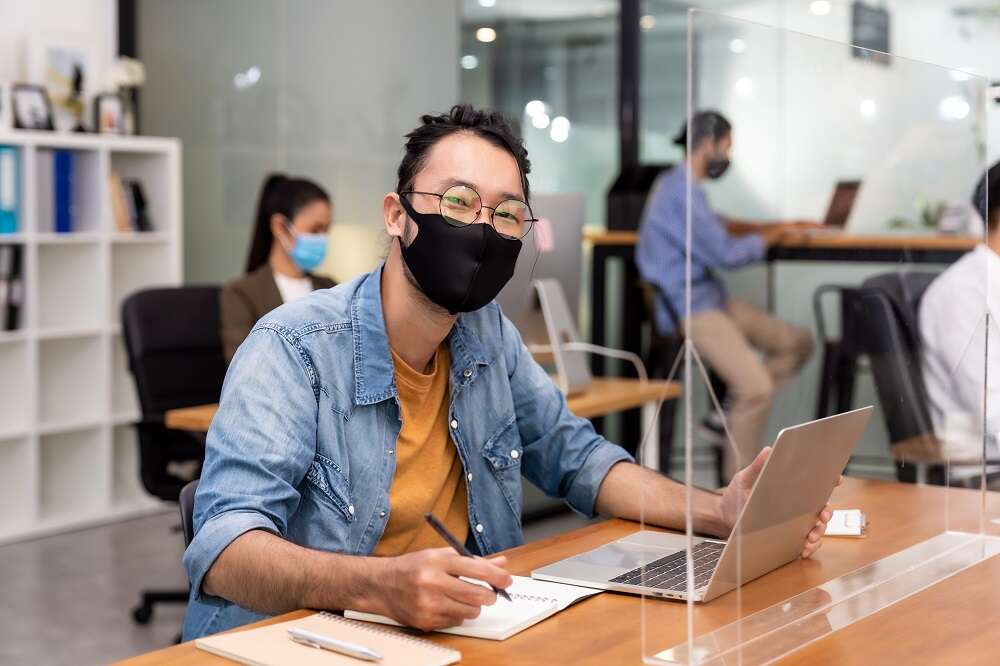
By Marina Vassilopoulos, writes for PSG Global
The Covid-19 pandemic has drastically altered the concept of the office as we know it. From the rise of coworking and hybrid models to an increased focus on the well-being of staff, the traditional office no longer exists. The businesses that have failed to adapt have experienced staffing shortages, partially due to The Great Resignation triggered by the pandemic.
As the office dynamic continues to shift, with an increased focus on younger generations due to the rise of environmentalism, PSG Global has investigated the future. What will the offices of Gen Z ‘Zoomers’ (those born from 1997-2012) look like: what amenities, business models and changes are next for the office?
Why the Office As We Know It Is Gone
The traditional office was eradicated by the Covid-19 pandemic. Gone are the days of commuting every day, wearing ironed shirts and invading your deskmate’s personal space. Instead, the majority of offices have found themselves adapting to the well-being and needs of their employees.
In basic terms, this has translated to hybrid and work-from-home business models, a relaxed uniform or an increased number of dress down days, and well-spaced desks. These measures are not only to prevent the spread of coronavirus, but have had several marked impacts on staff themselves.
For example, in a recent GCUC survey, 84% of staff stated that flexible working environments made them feel more engaged and motivated. Meanwhile, a government survey found 78% of those working from home felt they received an improved work life balance. Staff are resultantly happier in their personal lives, with happy staff translating to individuals that flourish within a working environment.
Past Vs. ‘Post’-Covid Office Requirements
While offices have existed since Roman times, it is only recently that the modern office began to take shape. Traditional offices were dedicated to one business, with private cubicles for workers and bland designs throughout for minimal distractions. Modern, pre-Covid offices have instead chosen to have open-plan layout and high-end, fashionable furniture such as ergonomic desk chairs and innovative technology features.
The pandemic instigated another period of change for the office, as businesses discovered how to navigate lockdown periods and isolation periods. As a result, the post-Covid office is flexible, creative and prioritises the well-being of its staff. The main way the post-Covid office offers this service to its employees is via hybrid or coworking business models and exciting office spaces that foster collaboration. As a result, it is no wonder that UK census results revealed that 85% of employees favoured the ‘hybrid’ approach, splitting their time between their home and office.
Such an approach allows workers to spend more time with their families and interact regularly with colleagues without feeling that their work is a sole priority in life. And now, with an increased number of offices deciding to refurbish their spaces to include new, innovative and exciting features, many might feel working in the office is actually a luxury. From inviting, open spaces to food markets and green features, the modern office has become a space in which architects and interior designers can explore new, creative avenues.
As proven by shifts in trends alongside the impact of Covid-19, our workplaces are not set in stone. These spaces will continue to adapt depending on the needs of those utilising them. While the current environment is likely to be associated with late Baby Boomers (born 1946 to 1964), midlife Generation X (born mid-1960s to early 1980s) and Millenials (1981 to 1996), there is little doubt that the office space will shift again to adapt to the needs of Gen Z.
So, what are the needs of Gen Z?
Covid-19 lockdown periods and isolation periods have led to Gen Z craving in-person socialisation. After a lack of face-to-face learning at both school and university, younger individuals are sick of Zoom, Skype and Teams. The once-dreaded workplace now offers opportunities for connecting to colleagues, formulating friendships that attending university online may not have provided.
As a result, a poll from Generation Lab discovered 40% of college students and recent graduates would prefer to be in the office full-time. Similarly, a SkyNova interview of 1,000 workers discovered 47% of Gen Z workers wanted in-person roles. These figures are higher than those of other generations, who have experienced highly sociable education and working years prior to the pandemic.
Growing up online has had other impacts for Gen Z. Flexibility is a high-ranking priority for the generation, with Microsoft’s Work Trend Index 2022 discovering that 49% of Gen Z workers are likely to consider transitioning to a hybrid model in their current role.
After all, following years of studying online and not having to commute to university or other places – why start now? Bolstered by a struggling labour market, young workers have been able to negotiate work-life perks that were unavailable to prior generations. Having grown up witnessing their parents and older generations harbouring negative feelings toward traditional working styles, from commuting to rigid structures, it is no wonder. As a result, Gen Z is instigating a spin towards flexibility – one that should be lauded for all workers.
Finally, Gen Z seeks a shift in values. An article by the Economic Times states ‘the youngest members of the workforce have demanded what they see as a long overdue shift away from corporate neutrality toward a more open expression of values’. The core characteristics (and values) held by Gen Z are expansive, and include:
- Diversity
- Pragmatism
- Progressive politics
- A focus on mental health
- Native use of technology
- Green and sustainable practices
These characteristics are varied, but have a key theme: connectivity. Workers want to surround themselves with like-minded individuals in an inclusive environment. Mirroring this, the Work Trend Index 2022 found that, beyond the traditional pursuit of pay, 46% of young Gen Z employees sought a work culture that resonated with their own values. Whether this materialises via a manager that is supportive of a mid-day run, mental health days or colleagues that support diversity, Gen Z is actively seeking kinship in the workplace.
Visualising Gen Z Offices
There are physical changes happening in the office landscape to support the aforementioned needs of Gen Z. For example, there has been a rise in offices introducing green and sustainable spaces to promote biodiversity and eco-friendly policies. This can materialise via going paperless or introducing monthly green challenges across the business. Companies can also pursue green in the literal sense during refurbishment, adding plants to the office for biophilia. Plants not only look great, but have several benefits for your employees, including reducing stress, increasing productivity and cleaning the air – making your office the perfect place for Zoomers.
The physical design of your office may be different to suit Gen Z’s needs. Firstly, as an environmentally-aware generation, Gen Z is less likely to drive cars but travel using public transport. As a result, office space should be accessible, located nearby bus, train or other public services.
Next, the interior structure of your office may differ. Employee comfort is paramount in the office of the future, so ergonomic furniture, such as standing desks, are likely to grow in popularity. Whether you offer staff these desks at home to work from while they use standing treadmills or the office can accommodate a mixture of standing and sitting staff, these tools are likely to become increasingly common. This increase is in conjunction with the use of innovative automations that allow the native technology users, the first to grow up using computers and tablets, to feel comfortable.
Finally, a Gen-Z-orientated office should have a focus on wellness. Whether more handwashing or sanitation stations to deal with the ongoing impacts of Covid-19 or wellness rooms, many businesses are having to introduce new, exciting features to appeal to younger staff. For example, some of the items introduced to competitive coworking spaces include:
- Fitness centres
- Yoga spaces
- Basketball courts
- Canteens offering exciting and rotating meals, such as street food and healthy snacks
- Meditation and wellness room
Ultimately, Gen Z desires social and private spaces when working. Such spaces ensure that they can engage in some focused work alongside collaborative work, allowing staff to relax or challenge themselves appropriately. As younger staff evidentially want to spend more time in the office, businesses should focus on making a ‘home away from home’, an office that people will want to visit five days a week or regularly.
How Diversity & Other Key Requirements May Shift
As stated, diversity in the office is a key factor for Gen Z when choosing or applying for a role. Not only one of the most populated generations, the age group is also the most racially, ethnically and culturally diverse. Having grown up with the USA’s first Black president, the legalisation of gay marriage and movements such as Black Lives Matter, Gen Z welcomes differences in race, sexual orientation and religion.
Businesses are responding by prioritising diversity. A recent Monster survey discovered that an incredible 83% of Gen Z candidates prioritise a company’s commitment to diversity and inclusion. With Gen Z set to comprise 36% of the global workforce, appealing to the demographic has never been more important – or industries risk labour shortages and, ultimately, collapse. There are several ways in which a business can promote diversity and inclusion, such as:
- Offering implicit bias and diversity training
- Valuing diversity
- Educate managers and employees
- Create safe spaces in which employees feel free to express themselves
- Tackling any conscious or unconscious biases in the workplace
Alternatively, the progressive views on politics held by Gen Z could reshape office spaces in a different way. While it is illegal to discriminate on a political basis, social issues, such as racial equity, are at the forefront of Gen Z values. And, in an interesting turn, many younger people are rejecting political parties altogether – which may throw the basis of political discrimination away altogether. As such, repositioning political discrimination as ensuring indivuduals are the ‘right fit’ for the culture of a business may become more prevalant, leading to the creation of likeminded liberal or conservative offices.
The perfect Gen Z office is resultantly a kaleidoscope, an amalgamation of humanistic ideals and values. These offices may vary in shape, size and location, but it is evident that Gen Z is striving for more inclusive, sociable and comfortable workplaces. The days of dreading work are gone, with the Zoomers keen to welcome in a new era in which the workplace is a safe space to develop, socialise and improve oneself. Gen Z’s office spaces are resultantly something to be welcomed and revered, an almost utopian space in which diversity and inclusion are champions.
PSG Global is a highly reputable international office-fit out and relocation company based in the UK.


